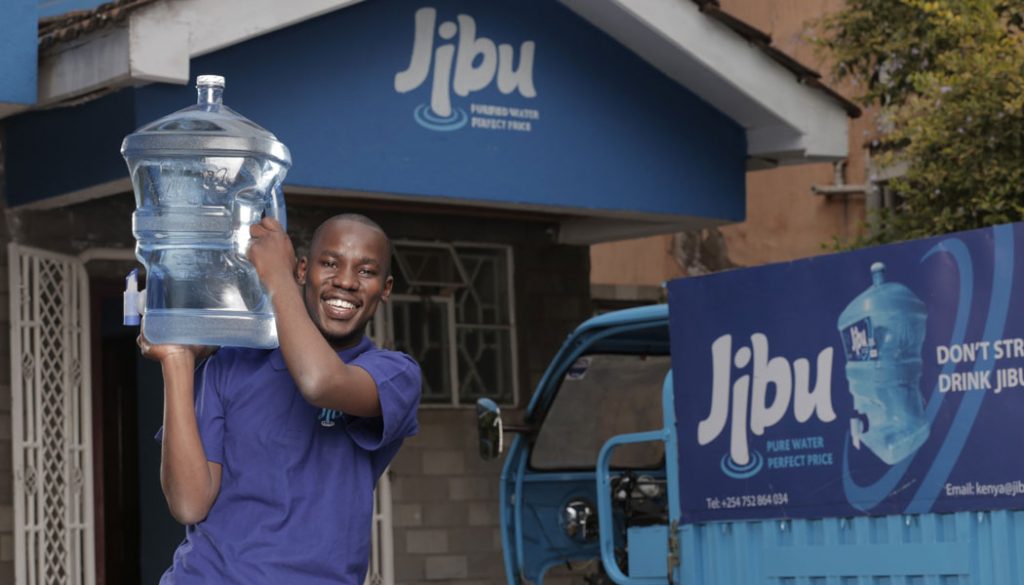In many African cities, clean, affordable drinking water is still a daily uncertainty. While urban populations continue to grow, public utilities remain overstretched, and bottled water—often imported or expensive—is out of reach for low-income households.
Jibu, a social enterprise headquartered in Kigali and Kampala, is addressing this challenge not as a charity, but as a franchise-driven utility model built for scale.
By empowering local entrepreneurs to own and operate water treatment and distribution businesses, Jibu is proving that safe drinking water can be accessible, profitable, and locally owned. And in the process, it’s redefining how essential services are financed and delivered in emerging cities.
Name: Jibu
Founded: 2012
Headquarters: Kampala, Uganda & Kigali, Rwanda
Markets: Rwanda, Uganda, Kenya, DRC, Zambia, Tanzania
Business Model: Social franchising + water filtration + micro-distribution
Core Product: Affordable, refillable drinking water sold at kiosks
Impact Footprint: 150+ franchises, 30M+ liters distributed annually
Funding: Mix of equity investment, impact debt, and franchise capital
Partners: Global Innovation Fund, Swiss Development Corp., Danone Communities, USAID
Tech Focus: AI-driven pricing, mobile onboarding, traceability systems
At the core of Jibu’s model is a belief that safe water distribution can be a viable business for local entrepreneurs—not just a public good or donor-funded service.
Each Jibu outlet is a locally owned franchise, equipped with a water purification system, branded refillable bottles, and support infrastructure. Entrepreneurs receive training, access to capital, quality control tools, and backend logistics support. In return, they sell purified water at affordable refill prices, often 70–90% cheaper than bottled water alternatives.
The result? Cities with fragmented public supply get decentralized water access, and underserved communities gain reliable, walkable access points for clean drinking water.
From Water to Utility Platform
While Jibu began with a focus on safe water, it is now evolving into a platform for essential urban services. Many franchisees are expanding into related offerings, including:
-
Cooking gas refills (LPG)
-
Solar-powered charging stations
-
Micro-distribution of health and hygiene products
-
Reusable household goods and water filters
This transformation from “water point” to essential service hub reflects a deeper insight: infrastructure in emerging markets must be modular, community-led, and revenue-generating to be sustainable.
Financing the Missing Middle
Jibu also solves a less visible problem: capital access for service entrepreneurs.
Traditional banks are hesitant to lend to small businesses in infrastructure sectors. Jibu bridges that gap through a franchise finance model, where it co-invests in setup costs and equipment. Once the franchise is profitable, owners gradually take on more equity and control—creating an ownership pathway for operators with no initial collateral.
This approach has enabled Jibu to scale quickly without sacrificing quality or diluting local leadership. Its financial model is as much a breakthrough as its water technology.
What the Industry Can Learn
Jibu’s success offers key takeaways for water systems innovators, impact investors, and urban policy thinkers:
-
Essential services can be local businesses. Utilities don’t need to be centralized to be reliable.
-
Franchise finance is a growth engine. Blending startup capital with gradual ownership creates incentives that last.
-
Affordability beats charity. Pricing that respects daily budgets creates long-term customer loyalty.
-
Decentralization builds resilience. Small-scale purification and distribution hubs are less prone to disruption than single-source utilities.
-
Infrastructure is a platform. Once the distribution system is in place, adjacent services can plug in.
The Road Ahead
As of 2025, Jibu is expanding into secondary cities and peri-urban zones, where traditional infrastructure is weakest. It is also developing data dashboards for water quality tracking, last-mile delivery options, and climate-resilient water systems that can function off-grid.
In a continent where over 300 million people still lack access to safe drinking water, Jibu is offering a pragmatic model—one that scales by empowering people, not pipelines.
About the Author
Aurel Kinimbaga is a finance executive and contributor specializing in innovation, inclusive growth, and business strategy across African markets. He writes regularly on entrepreneurship, digital infrastructure, and the economic forces shaping the continent’s future.
